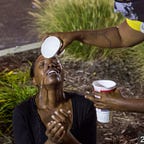Good Friday in America
by Rev. Osagyefo Sekou
“They killed another one.”
Every other day in America is Good Friday — death at the hands of the state. It happens so often that the news of such a tragedy elicits a rather ordinary response: “They killed another one.”
As the death toll rings throughout Christendom’s past, state violence is ever present. Ferguson — America’s Nazareth — has given birth to a new theology at work in the world. The irrelevance of the church was made evident on West Florissant — the Tahrir Square of the Midwest.
In the early days of August, a poor, queer, black and female Jesus took up a cross and faced with tanks, teargas, and rubber bullets. In the life of most of the young folks on the streets, the church has been site of condemnation and rejection. It is in the street with righteous indignation that God in flesh has come to us yet again.
In the early days of August, a poor, queer, black and female Jesus took up a cross and faced with tanks, teargas, and rubber bullets.
Night after night all but consumed in bellowing teargas clouds, a cry from the wildness could be heard: “Fuck the Police.” Religious leaders were more concerned with young people’s profanity than the profane conditions they lived in. Early in the morning, lowly and angry, they still rose. If there is no remission of sin without the shedding of blood, then Michael Brown’s blood may be our salvation.
To strip Jesus’s cross of its political content is to continue the lie that black lives do not matter. For Jesus — a first century nigger — who lead a love rebellion against the Empire and was crucified. This moment in the liturgical calendar signifies what is happening. God in flesh — a Palestinian peasant — was crucified at the hands of the state blessed by apostate clergy. Jesus, no more than a handy man, shook the Roman Empire to its core.
The lie of empire was their lives did not matter. And he refused. Crucifixion, in and of itself, was a quite ordinary act in a death-dealing civilization. Thousands of Palestinians were hung on a tree for the people to contemplate the mire prospect of rebellion. Their insurrection would not be tolerated. In black communities, police are no more than Roman centurions — occupiers who operate without impunity.
In black communities, police are no more than Roman centurions — occupiers who operate without impunity.
In first century Palestine, a gospel could be only written and distributed by Caesar, articulating one’s rights and benefits in the Roman Empire. The leader of the empire had sole authority administer the gospel. Yet, the followers of a poor Palestinian lived a gospel that caused the empire to shutter.
Like in the days of the Roman Empire, a new gospel is being written every day in the streets of Ferguson — a radically queer, black, poor, and woman-led story of resistance in the face of death. Though Good Friday is perpetual it is not permanent. Every act of resistance — teddy bear laid at make shift memorial in unimportant place among an unimportant people — is holy and transformative. The task before Christianity is to see Jesus in the streets being hated, haunted, and hunted by the powers today. The Black Lives Matter movement is a cry from the cross of American democracy. Good Friday is now.
Good Friday is now.
Rev. Osagyefo Sekou is a Freeman Fellow with the Fellowship of Reconciliation and a visiting scholar at the Martin Luther King Papers at Stanford University.
